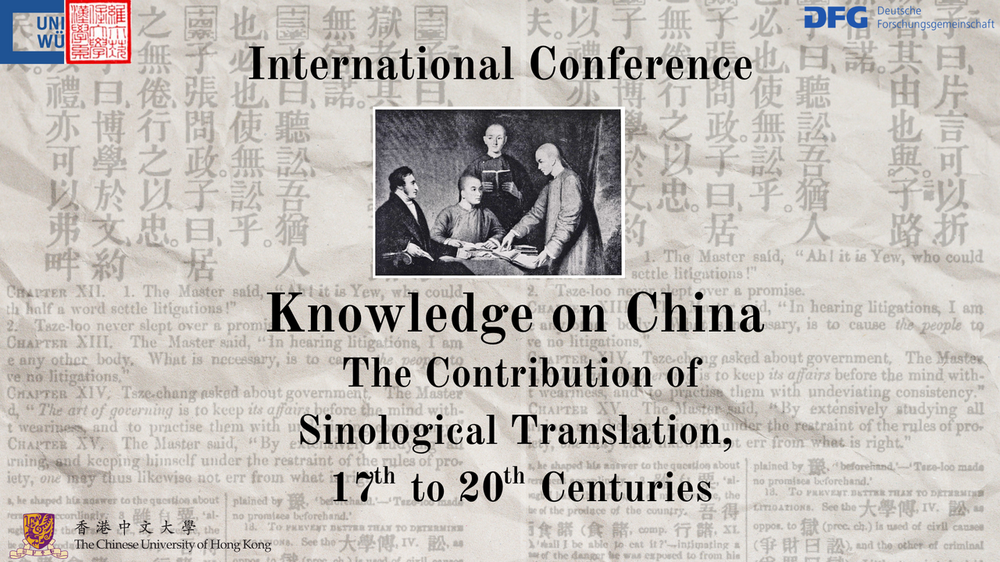Knowledge on China: The Contribution of Sinological Translation, 17th to 20th Centuries

20-22 June 2024
Julius Maximilian University of Würzburg
Schelling Forum of the Bavarian Academy of Sciences and Hubland Campus South (Z6)
Co-organized by the Julius Maximilian University of Würzburg (JMU), Institute of East and South Asian Cultural Studies, Prof. Roland Altenburger; and the Chinese University of Hong Kong (CUHK), Research Center for Translation, Prof. Lawrence Wang-Chi Wong.
The translation of Chinese source texts has long been at the center of academic sinological engagement with China. In Europe, first of all, it has been assumed, and with good reason, that the translation of texts from the Chinese written tradition was the royal road toward the improvement of knowledge about the Chinese civilization, about its literature, thought and beliefs, on the one hand, but also about its social relations, customs and mentality, its institutions and governance, and its technological achievements, on the other. For instance, some of the early translations of Chinese novels into the European languages, with their copious bodies of annotation, approximated encyclopaedic compendia of ‘all things Chinese’. Translations of non-literary texts, such as the legal code, were set in more pragmatic contexts and also served the needs of stakeholders in China, such as merchants or diplomats.
The motivation for the choice of a certain text for translation is often worth consideration, along with a translation’s quality and the criteria of success. They often depended on a sinological translator’s working context, the widely varying degrees of familiarity with and spatial distance from China, the availability of reference tools and native-speaker assistants. The present conference invites the attendees to rethink sinological translations from the perspective of their specific contributions to the increase and deepening of knowledge about China. Its tentative timeframe, spanning from the 17th and into the 20th century, allows for the inclusion of ‘proto-sinological’ translators, such as members of the Jesuit mission to China, as well as translators with a sinological background but not working in strictly academic contexts. It encourages the presentation of case studies, the consideration of each individual translation’s contribution to China-related knowledge, and the involvement of knowledge-related questions in the translation’s presentation. The identification of landmarks of sinological translation that retrospectively served a ground-breaking function in their provision and circulation of knowledge about China are particularly welcome.
This conference brings together sinologists and scholars of translation studies from Europe and China, as well as from around the world (Australia, the U.S.A.). It can rely on a core group of contributors who already participated in some of the earlier conferences. This inner circle has been expanded by a number of new participants, in particular colleagues from Europe, both senior as well as junior scholars. We expect a total of 21 contributing participants, whose papers are divided up into ten panels and a keynote address. For each paper we allow for 30 minutes of presentation and 15 minutes of Q&A.
Short History
Previous international conferences and workshops of this series initiated by the Research Centre for Translation at the CUHK in 2013 took place in Hong Kong (2013, 2019) or in Europe, in collaboration with various partner institutions (SOAS, London, 2014; La Sapienza, Rome, 2022).
Publications
- Sinologists as Translators in the Seventeenth to Nineteenth Centuries, edited by Lawrence Wang-chi Wong and Bernhard Fuehrer. The Chinese University of Hong Kong Press, 2015 (“Asian Translation Tradition Series”) https://cup.cuhk.edu.hk/index.php?route=product/product&product_id=3314
- Crossing Borders: Sinology in Translation Studies, edited by T. H. Barrett and Lawrence Wang-chi Wong. The Chinese University of Hong Kong Press, 2022. (“Asian Translation Tradition Series”) https://cup.cuhk.edu.hk/CrossingBorders
- A selection of articles from these collections has been translated into Chinese and is in preparation for publication.
- From the contributions to the present conference we plan to edit yet another volume in the series “Asian Translation Tradition Series”.
Program
- Program here (Update: May 10th 2024)
- Abstract booklet here(Update: May 10th 2024)


